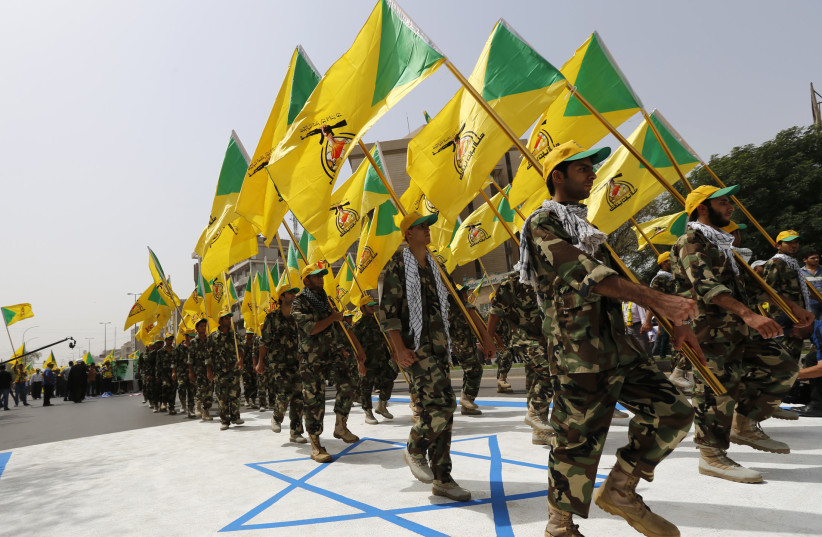Iran was behind the rocket attack against American forces stationed at the al-Asad airbase in western Iraq on Monday, both US Secretary of State Lloyd Austin and Israeli Defense Secretary Yoav Gallant said later in the day, warning that this was a “dangerous escalation.”
They spoke as the region braced for an Iranian attack against Israel, along with additional potential attacks by the Islamic Republic’s proxy groups, including Hezbollah in Lebanon.
The first response, however, appears to have occurred in Iraq, as two Katyusha rockets were fired at al-Asad airbase. Gallant and Austin spoke of the attack as “Iran aligned” and agreed that it “marked a dangerous escalation and demonstrated Iran’s destabilizing role in the region,” the Pentagon said.
Austin reiterated the “unwavering US commitment to Israel’s security in the face of threats from Iran, Lebanese Hezbollah, and other Iran-aligned militia groups,” it said. Austin also updated Gallant on “measures to strengthen US military posture in the region in light of this escalating situation,” the Pentagon added.
Gallant on Tuesday said he had understood from Austin that the US was “determined to support us and to work together” with Israel.

“The cooperation between Israel and the United States is critical to our readiness,” he stated.
Iraq’s military condemned on Tuesday “reckless” actions against bases on its soil.
Iran-backed militias
“We reject all reckless actions and practices targeting Iraqi bases, diplomatic missions, and the whereabouts of the international coalition’s advisers, and everything that would raise tension in the region,” the Iraqi military statement said.
Last week Washington carried out a strike in Iraq against individuals whom US officials said were militants getting ready to launch drones and posed a threat to American and coalition forces.
The potential of large-scale attacks against Israel by Iran and its proxy group Hezbollah is significant in the aftermath of twin assassinations against Hezbollah commander Fuad Shukr and Hamas leader Ismail Haniyeh, widely attributed to Israel. The IDF has taken responsibility for Shukr’s killing but not for the Haniyeh assassination.
The US has deployed warships to the Middle East, as Washington seeks to bolster regional defenses. A rare ally of both America and Iran, Iraq hosts 2,500 US troops and has Iran-backed militias linked to its security forces. It has witnessed escalating tit-for-tat attacks since the Hamas-led invasion of southern Israel on October 7, which sparked the Israel-Hamas war.
Baghdad has struggled to rein in Iran-backed armed groups that have attacked American forces there and in neighboring Syria dozens of times since October 7.
Iraqi Prime Minister Mohammed Shia al-Sudani spoke with US Secretary of State Anthony Blinken on Sunday.
An Iraqi official said Blinken asked Sudani to help decrease regional tensions by helping to convince Iran to temper its response.
US Army Gen. Michael “Erik” Kurilla, head of Central Command (CENTCOM), is currently in the Middle East. An American official said Kurilla was speaking with allies to ensure there was coordination in case of an Iranian attack against Israel. In April, the US and Israel worked with armies from Jordan, Great Britain, and France to shoot down 300 Iranian drones and missiles aimed at the Jewish state.
US President Joe Biden and Vice President Kamala Harris were briefed by a national security team “on the threats posed by Iran and its proxies to Israel” and to American service members in the region, the White House said.
The briefing also touched on the attack at al-Asad airbase in Iraq. “They discussed the steps we are taking to defend our forces and respond to any attack against our personnel in a manner and place of our choosing,” the White House said.
“They were updated on US military efforts to support the defense of Israel should it be attacked again. They were also briefed on continued diplomatic efforts to de-escalate regional tension and to bring the ceasefire and hostage release deal to a conclusion,” it stated.
